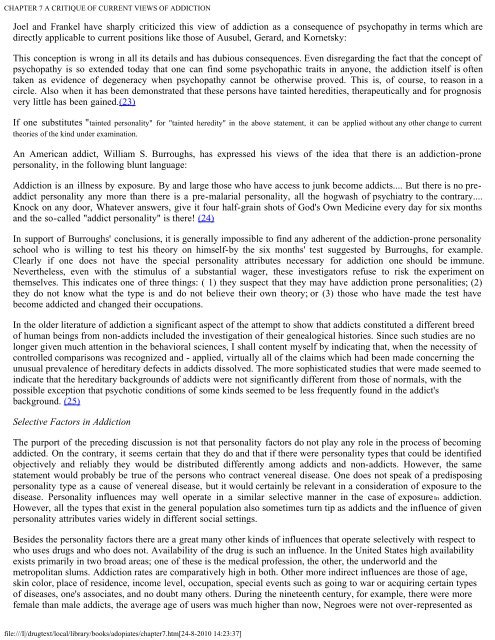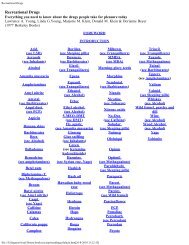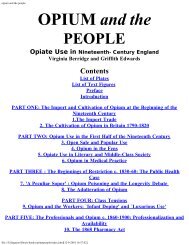Addiction and Opiates
Addiction and Opiates
Addiction and Opiates
You also want an ePaper? Increase the reach of your titles
YUMPU automatically turns print PDFs into web optimized ePapers that Google loves.
CHAPTER 7 A CRITIQUE OF CURRENT VIEWS OF ADDICTION<br />
Joel <strong>and</strong> Frankel have sharply criticized this view of addiction as a consequence of psychopathy in terms which are<br />
directly applicable to current positions like those of Ausubel, Gerard, <strong>and</strong> Kornetsky:<br />
This conception is wrong in all its details <strong>and</strong> has dubious consequences. Even disregarding the fact that the concept of<br />
psychopathy is so extended today that one can find some psychopathic traits in anyone, the addiction itself is often<br />
taken as evidence of degeneracy when psychopathy cannot be otherwise proved. This is, of course, to reason in a<br />
circle. Also when it has been demonstrated that these persons have tainted heredities, therapeutically <strong>and</strong> for prognosis<br />
very little has been gained.(23)<br />
If one substitutes "tainted personality" for "tainted heredity" in the above statement, it can be applied without any other change to current<br />
theories of the kind under examination.<br />
An American addict, William S. Burroughs, has expressed his views of the idea that there is an addiction-prone<br />
personality, in the following blunt language:<br />
<strong>Addiction</strong> is an illness by exposure. By <strong>and</strong> large those who have access to junk become addicts.... But there is no preaddict<br />
personality any more than there is a pre-malarial personality, all the hogwash of psychiatry to the contrary....<br />
Knock on any door, Whatever answers, give it four half-grain shots of God's Own Medicine every day for six months<br />
<strong>and</strong> the so-called "addict personality" is there! (24)<br />
In support of Burroughs' conclusions, it is generally impossible to find any adherent of the addiction-prone personality<br />
school who is willing to test his theory on himself-by the six months' test suggested by Burroughs, for example.<br />
Clearly if one does not have the special personality attributes necessary for addiction one should be immune.<br />
Nevertheless, even with the stimulus of a substantial wager, these investigators refuse to risk the experiment on<br />
themselves. This indicates one of three things: ( 1) they suspect that they may have addiction prone personalities; (2)<br />
they do not know what the type is <strong>and</strong> do not believe their own theory; or (3) those who have made the test have<br />
become addicted <strong>and</strong> changed their occupations.<br />
In the older literature of addiction a significant aspect of the attempt to show that addicts constituted a different breed<br />
of human beings from non-addicts included the investigation of their genealogical histories. Since such studies are no<br />
longer given much attention in the behavioral sciences, I shall content myself by indicating that, when the necessity of<br />
controlled comparisons was recognized <strong>and</strong> - applied, virtually all of the claims which had been made concerning the<br />
unusual prevalence of hereditary defects in addicts dissolved. The more sophisticated studies that were made seemed to<br />
indicate that the hereditary backgrounds of addicts were not significantly different from those of normals, with the<br />
possible exception that psychotic conditions of some kinds seemed to be less frequently found in the addict's<br />
background. (25)<br />
Selective Factors in <strong>Addiction</strong><br />
The purport of the preceding discussion is not that personality factors do not play any role in the process of becoming<br />
addicted. On the contrary, it seems certain that they do <strong>and</strong> that if there were personality types that could be identified<br />
objectively <strong>and</strong> reliably they would be distributed differently among addicts <strong>and</strong> non-addicts. However, the same<br />
statement would probably be true of the persons who contract venereal disease. One does not speak of a predisposing<br />
personality type as a cause of venereal disease, but it would certainly be relevant in a consideration of exposure to the<br />
disease. Personality influences may well operate in a similar selective manner in the case of exposure In addiction.<br />
However, all the types that exist in the general population also sometimes turn tip as addicts <strong>and</strong> the influence of given<br />
personality attributes varies widely in different social settings.<br />
Besides the personality factors there are a great many other kinds of influences that operate selectively with respect to<br />
who uses drugs <strong>and</strong> who does not. Availability of the drug is such an influence. In the United States high availability<br />
exists primarily in two broad areas; one of these is the medical profession, the other, the underworld <strong>and</strong> the<br />
metropolitan slums. <strong>Addiction</strong> rates are comparatively high in both. Other more indirect influences are those of age,<br />
skin color, place of residence, income level, occupation, special events such as going to war or acquiring certain types<br />
of diseases, one's associates, <strong>and</strong> no doubt many others. During the nineteenth century, for example, there were more<br />
female than male addicts, the average age of users was much higher than now, Negroes were not over-represented as<br />
file:///I|/drugtext/local/library/books/adopiates/chapter7.htm[24-8-2010 14:23:37]





